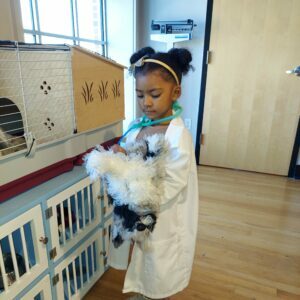Play Matters
 Play isn’t all fun and games — it’s also an important teaching tool! Through play, kids learn how to interact with others and develop critical lifelong skills.
Play isn’t all fun and games — it’s also an important teaching tool! Through play, kids learn how to interact with others and develop critical lifelong skills.
Physical
Active play is critical for kids’ physical development. It helps children hone their coordination, balance, gross-motor skills (large movements like crawling and walking) and fine-motor skills (smaller movements like picking objects up).
Emotional
It’s children’s way of creating imaginary worlds, characters and plots that match their emotional state, helping them learn to express and regulate their feelings. Through play, kids learn to cope with their emotions as they act out fear, frustration, anger and aggression in a situation they control. It’s also a chance for them to practice empathy and understanding.
Social
Cooperative play helps kids hone their social skills as they figure out how to negotiate group dynamics. It helps them learn how to collaborate and compromise with others, recognize and respond to others’ feelings, share, show affection, resolve conflicts, and adhere to the rules. In turn, these important early lessons help children understand the roles and rules of society!
Cognitive
Self-directed play gives kids the opportunity to hone their decision-making skills. Selecting a game, focusing on that activity, and seeing it through to the end, is an important element of cognitive control, and helps sharpen their planning skills and attention spans.


